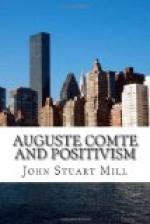It remains to give an account of the Temporal Power, composed of the rich and the employers of labour, two classes who in M. Comte’s system are reduced to one, for he allows of no idle rich. A life made up of mere amusement and self-indulgence, though not interdicted by law, is to be deemed so disgraceful, that nobody with the smallest sense of shame would choose to be guilty of it. Here, we think, M. Comte has lighted on a true principle, towards which the tone of opinion in modern Europe is more and more tending, and which is destined to be one of the constitutive principles of regenerated society. We believe, for example, with him, that in the future there will be no class of landlords living at ease on their rents, but every landlord will be a capitalist trained to agriculture, himself superintending and directing the cultivation of his estate. No one but he who guides the work, should have the control of the tools. In M. Comte’s system, the rich, as a rule, consist of the “captains of industry:” but the rule is not entirely without exception, for M. Comte recognizes other useful modes of employing riches. In particular, one of his favourite ideas is that of an order of Chivalry, composed of the most generous and self-devoted of the rich, voluntarily dedicating themselves, like knights-errant of old, to the redressing of wrongs, and the protection of the weak and oppressed. He remarks, that oppression, in modern life, can seldom reach, or even venture to attack, the life or liberty of its victims (he forgets the case of domestic tyranny), but only their pecuniary means, and it is therefore by the purse chiefly that individuals can usefully interpose, as they formerly did by the sword. The occupation, however, of nearly all the rich, will be the direction of labour, and for this work they will be educated. Reciprocally, it is in M. Comte’s opinion essential, that all directors of labour should be rich. Capital (in which he includes land) should be concentrated in a few holders, so that every capitalist may conduct the most extensive operations which one mind is capable of superintending. This is not only demanded by good economy, in order to take the utmost advantage of a rare kind of practical ability, but it necessarily follows from the principle of M. Comte’s scheme, which regards a capitalist as a public functionary. M. Comte’s conception of the relation of capital to society is essentially that of Socialists, but he would bring about by education




